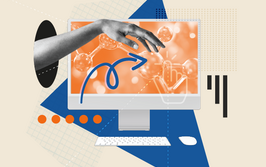Diversity Matters
It’s a fact that the pharma industry is dominated by white men. What does this mean for people from different ethnic backgrounds?
Stephanie Vine | | 4 min read | Interview

We recently interviewed Tunde Bello, Vice President of Clinical Pharmacology and Pharmacometrics at Bristol-Myers Squibb, about his esteemed career at the company. As a Black British man living in the US, Bello is aware that some people have preconceptions about race – and that people in minority groups can be watched more closely than their white colleagues. He has plenty of experiences of walking into a meeting room early in his career and being the only black person. Here, we speak with Bello about his experience of working in the pharmaceutical industry – and the discrimination that people from diverse backgrounds can face.
How has diversity impacted your career?
In my UK roles, there were very few black people working in the lab. I suppose people found it unusual to see a person with my background and color in these roles – and maybe there was a level of hesitation or skepticism about my abilities. But I think I was able to get past that based on performance.
Similarly, when I went over to the US there were a low number of people from different backgrounds in the industry. But a lot has changed since 1998, when I arrived in the States. When I returned to BMS, following 11 years with Pfizer, it was great to see the level of change and the commitment of the company to making sure we have a diverse and inclusive workforce.
However, I acknowledge that my experience as a black British person coming to the US is not the same as the experience of my African-American colleagues. Many people are a little bewildered when they hear my accent for the first time – as well as interested in my mix of characteristics – and I think this does sometimes lead to preconceptions being shattered. And so, my experience has been, overall, pretty good.
My parents always told me that I had to be at least as good as – or better than – my white colleagues to progress because there would be certain assumptions about my abilities. They told me that I would be scrutinized and watched carefully in terms of how I perform. And I think this is something that almost every professional black person is aware of as they move through their industry.
Having the right attitude is one thing – but you also need support. For example, other people had to see the potential in me to sponsor my PhD. When BMS came over to the UK looking for people, they were agnostic to background and race – but that’s not guaranteed.
I believe that your performance and capabilities should ultimately determine how far you can go. But it can definitely be more challenging for some folks than others, which is not right or fair.
I’ll also add that the drug development process comes with risks; only a fraction of the drugs that enter clinical development make it all the way to being approved – and that means you need to take calculated risks. If you’re in a minority group in the industry, you may wonder if the risks you take or the mistakes you make are perceived differently or compared with those of your white male counterparts. That can be tough and lead to insecurities or even impostor syndrome.
Personally, I’ve always focused on trying to master my craft, which hopefully makes any considerations around my race secondary.
What prevents people from minority groups getting involved with the pharma industry?
I think perhaps the biggest problem is a lack of awareness about how the industry works and the opportunities. The pharma industry is huge and there are many different departments, functions, and roles – it’s not just made up of scientists. There is room for people with all types of educational backgrounds. It’s also important to have role models – you want to see people like you in these positions, being able to advance and do well so that it opens your eyes up to the possibilities.
From a historical perspective, there can also be a certain level of mistrust in the black community of the healthcare and the pharmaceutical industry, but I hope this is changing.
How is BMS working to promote diversity?
There are a range of People Business Resource Groups (PBRGs) that the company sponsors and supports. We have groups that represent Women, Latino, African-Americans, LGBT, Veterans, Asians, Colleagues with Disabilities, and Millennials. When my schedule allows, I’m involved in the activities of a few of these groups – BOLD (Black Organization for Leadership Development), BEN (the Black Executive Network), and PAN (Pan Asian Network). The company has made a huge commitment to diversity – and it goes all the way to the top. The leaders of the various colleague groups are seconded from their regular roles for between 2-3 years.
In my opinion, we don’t have enough people of color represented in the sciences and technical fields. Fortunately, BMS has a number of STEM initiatives and is reaching out to teaching institutions – whether it be high school level or even historically black colleges – to let them know what BMS is doing and to open their eyes to the potential opportunities in this industry.

Making great scientific magazines isn’t just about delivering knowledge and high quality content; it’s also about packaging these in the right words to ensure that someone is truly inspired by a topic. My passion is ensuring that our authors’ expertise is presented as a seamless and enjoyable reading experience, whether in print, in digital or on social media. I’ve spent fourteen years writing and editing features for scientific and manufacturing publications, and in making this content engaging and accessible without sacrificing its scientific integrity. There is nothing better than a magazine with great content that feels great to read.



















